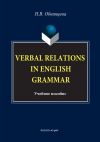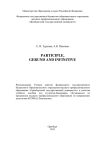Текст книги "English Grammar for University Students. Part 4"

Автор книги: Марина Воловикова
Жанр: Учебная литература, Детские книги
сообщить о неприемлемом содержимом
Текущая страница: 2 (всего у книги 8 страниц) [доступный отрывок для чтения: 2 страниц]
The subjective infinitive construction
The Subjective Infinitive Construction is the construction in which the Infinitive (usually the Infinitive phrase) is in predicate relation to a noun in the Common case or a pronoun in the Nominative case.
The Subjective Infinitive Construction is used as a Complex Subject in the following cases:
1. With the verbs to seem, to appear to prove, to turn out, to happen, to chance.
The building appears to have been used as a place of worship.
Janet seemed to take offence at my comments on her work.
Susan proved to be a good friend when she lent me some money.
Mum happened to be cooking dinner when I came home.
2. With the verbs in the Passive Voice:
a) verbs denoting saying (to announce, to declare, to report, to say, to state, etc.).
The war was declared to be over.
She is said to have travelled to Peru last year.
b) verbs denoting mental activity (to believe, to consider, to expect, to find, to know, to mean, to presume, to regard, to suppose, to think, to understand, etc.).
This couple were meant to stay together.
MSU is considered to be the best University in Russia according to world ranking systems.
She is thought to have attended the conference.
c) verbs of sense perception (to feel, to hear, to see, to watch).
They were seen to leave the city by train.
d) the verb to make.
He was made to bring his apologies.
3. With likely, unlikely, sure, certain. In this case only the non-perfect forms of the Infinitive are used, with future reference.
She is likely to be caught in a traffic jam.
They are sure to be present at the meeting.
The for-to-infinitive construction
In the For-to-Infinitive Construction the Infinitive is in predicate relation to a noun in the common case or a pronoun in the objective case preceded by the preposition for.
The for-to-Infinitive construction has the same functions as a single Infinitive, though with some restrictions.
1. Subject. The For-to-Infinitive Construction is often used in this function with the introductory it.
It is difficult for them to comprehend that.
For me to hear him was disturbing.
2. Predicative. In this function the construction is mostly used with the link verb to be.
The only solution is for him to leave the country.
This is for you to learn by heart.
3. Object. The For-to-Infinitive construction functions as object of both verbs and adjectives.
He waited for the door to open.
I asked for the papers to be sent on time.
She is anxious for her daughter to enter a good school.
4. Attribute.
It was time for her to move on.
The best thing for you to do is to have proper rest.
5. Adverbial modifier of purpose.
She paused for us to express our emotions.
He started running for the chasers to lag behind.
6. Adverbial modifier of result.
The text was too difficult for us to translate without a dictionary.
He had done enough for us to ask him to stop at once.
Exercises
Exercise1.Give the right form of the Infinitive
1. When we asked him he refused … (to answer). 2. Don’t worry, he hasn’t forgotten … (to take) the medicine. 3. She must …. (to sleep) badly last night, she looks tired. 4. She put on the hat and turned to me … (to evaluate). 5. He appeared …(to listen). 6. Everything seemed (to change) since his last visit. 7. He was not the man (to forgive) offence to anybody. 8. Jack is in his garage. He must … (repair) his car. 9. I am glad … (to travel) to England. I have so many wonderful impressions of that trip! 10. You could … (to warn) me beforehand so that that I wouldn’t have to wait for you. 11. Don’t interrupt him when he is working. He hates … (to interrupt). 12. No words can fully describe the beauty of the place. It must … (to see).
Exercise 2. Insert ‘to’ before the Infinitive where required
1. I would rather … stay at home today. 2. Why not … come down to my place? 3. She made me … repeat the words several times. 4. I won’t have anyone … come interfering. 5. They ought … have asked my advice. 6. They heard the girl … cry out with joy. 7. You look tired you’d better … go home. 7. I saw him … cross the street a few minutes ago. 8. They were seen … play tennis together. 9. Let me … try this dress on. 10. I was made … stand still. 11. They helped me … search for him many times. 12. You ought not … talk back like this.
Exercise 3. Translate using the Infinitive in different syntactic functions
Subject
1. Было очень приятно поговорить с вами. 2. Всегда трудно принимать такие решения. 3. Глупо быть таким ревнивым. 4. Это не возможно сделать за один день. 5. Было приятно застать его дома. 6. Не нужно рассказывать ей подробности. 7. Засиживаться допоздна – вредно для здоровья. 7. Невозможно написать эссе за 5 минут. 8. Пора приниматься за работу.
Predicative
1. Ее задача заключалась в том, чтобы принести почту. 2. Наша задача – понять все функции инфинитива и научиться употреблять не личные формы. 3. Его мечта – найти хорошую работу. 4. В её обязанности входило выносить мусор. 5. Понять – значит простить.
Part of а Predicative (Secondary Predicative)
1. С ней приятно иметь дело. 2. На этом стуле удобно сидеть. 3. Хорошего друга найти нелегко. Его решение трудно объяснить.
Part of a Compound Verbal Predicate
1. Когда они начали смотреть фильм? 2. Вы должны работать усердно. 3. Он обычно приносил детям сладости. 4. Нам пришлось вызвать такси, чтобы не опоздать. 5. Она, бывало, подолгу гуляла. 6. Ему следует быть более пунктуальным.
Object
1. Я хочу сделать это сегодня. 2. Она была не рада встретить меня на вечеринке. 3. Извините, что побеспокоил. 4. Извините, что беспокою. 5. Я не знаю, что делать с этими непослушными детьми. 6. Она обещала научить нас готовить омлет. 7. Он очень богат. Он может позволить себе купить яхту. 8. Он решил отправиться в путешествие в тот же день.
Attribute
1. Он пришел первым, а ушел последним. 2. Мне не с кем обсудить эту проблему. 3. Ей нечего надеть на вечеринку. 4. У него семья, которую надо кормить (содержать). 5. Это подходящая книга для чтения в дороге. 6. Мне не нравится ваша идея отправиться в кругосветное путешествие.
Adverbial modifier
a) of result
1. Текст слишком большой, чтобы успеть перевести его сегодня. 2. Он был слишком расстроен, чтобы злиться. 3. Он слишком молод, чтобы понять своего отца. 4. Вы недостаточно образованы, чтобы занять данную вакансию. 5. Чай слишком горячий, чтобы пить его сразу. Нужно подождать. 6. История была слишком интересной, чтобы ее легко передать. 7. Он зашел слишком далеко, чтобы отступить. 8. Он был достаточно глуп, чтобы наслаждаться игрой. 9. Она была так любезна, что согласилась с моим предложением. 10. Вы думаете, я настолько глуп, чтобы упустить такую возможность?
b) of purpose
1. Я думаю, что поеду в Англию, чтобы улучшить свой английский. 2. Мэри, бледная и обеспокоенная, заставила его спуститься на кухню, чтобы позавтракать.3. Затем она пошла в сад, чтобы увидеть садовника. 4. Она решила сесть на диету, чтобы похудеть. 5. Я приехал поговорить с боссом. 6. Этой студентке придется много работать, чтобы догнать группу. 7. Нам пришлось взять такси, чтобы успеть в аэропорт.
Exercise 4. Choose the correct function of the Infi nitive and its constructions
1. She is a child not to be trusted
a) predicative b) attribute c) object
2. He waited for me to sit down.
a) prepositional object b) adverbial modifier of purpose c) complex object
3. The pain was too strong for him to think of anything else.
a) adverbial modifier of cause b)adverbial modifier of attendant circumstances c) adverbial modifier of result
4. It was impossible not to invite the Butlers for the evening.
a) subject b) predicative c) direct object
5. She made a gesture as if to touch him.
a) adverbial modifier of cause b) adverbial modifier of result c) adverbial modifier of comparison
6. They are likely to get married.
a) complex subject b) direct object c) predicative
7. There was no home for him to go.
a) subject b) complex subject c) attribute
8. She felt a sudden cold chill pass through her limbs.
a) attribute b) adverbial modifier of attendant circumstances c) complex object
9. To speak frankly, I’m not in favor of long engagements.
a) complex subject b) adverbial modifier of purpose c) parentheses
10. He extended his hand for Eric to shake.
a) complex object b) adverbial modifier of purpose c) adverbial modifier of cause
11. True sincerity is hard to find.
a) complex subject b) attribute c) part of a predicative
Exercise 5. State the functions of the Infinitive and its constructions and translate the sentences into Russian
1. I went to Oxford; and there I began to discover I was not the person I wanted to be. 2. I was too green to know that all cynicism masks a failure to cope. 3. I had got away from what I hated, but I hadn’t found where I loved, and so I pretended there was nowhere to love. 4. My “technique” was to make a show of unpredictability, cynicism and indifference. Then, like a conjurer with his white rabbit, I produced the solitary heart. 5. She had a very un-English ability to suddenly flash out some truth, some seriousness, some quick surge of interest. 6. She thought it must be nice to be totally alone in the world, to have no family ties. 7. I had to give up the flat in Russell Square and we spent three frustrating days looking for somewhere for her to live. 8. The next day I moved to the Russell Hotel, so that I had only to stroll out of the entrance and look across the square to see the house, to wait for the windows on that black third floor to light. 9. She stepped back for me to enter. 10. She sat in an armchair and gestured for me to sit on the huge sofa in the center of the room, but I shook my head. 11. She let silence pass again, as if to isolate what I said. 12. Neither I nor my children pretend to be ordinary people. They were not brought up to be ordinary. We are rich and we are intelligent and we mean to live rich, intelligent lives. 13. She seemed to decide to say nothing; then changed her mind. 14. Wait as long as Alison makes you wait. I do not think it will be very long. 15. That is for the two of you to settle. 16. She began to eat her toast, as if to bring us back to normal. I beckoned to the waitress for the bill. 17. Alison is not a present. She has to be paid for. And convinced that you have the money to pay. 18. She took my hand, but kept it and made me lean forward, to my surprise to kiss me on the cheek. 19. I said I was going to have some spaghetti. 20. She had come from Glasgow, it seemed, two months before, to be an art student.
(Источник: J. Fowles, 2012).
Exercise 6. State the functions of the Infinitive and translate the sentences into Russian
1. I’m waiting around for someone… a girl… to come back from Australia. 2. She was the strangest priest to confess before; but not the worst. 3. Perhaps it was Kemp who made me feel happier during those ten days. 4. She sat with her hands in her lap, waiting for me to speak, those clear eyes on mine. 5. In the morning I persuaded her to ring up and say that she wasn’t well, and we spent the day out in the country. 6. It was like a journey into space. I was standing on Mars, under a sky that seemed never to have known dust or cloud. 7. It took me many months to understand this, and many years to accept it. 8. I was forced to go frequently for walks to escape the claustrophobic ambience of the Lord Byron School. 9. I decided I would write a letter to Alison that night, to say that I didn’t want to hear from her again. 10. I tried to get him to return my smile, to confess that he had been pulling my leg; but his masklike face was drained of humor. 11. No. 46 turned out to be one of the largest houses in the road. 12. The men happened to have left two days before with a cargo of olive oil. 13. Later I was to discover that he was less miserable than he appeared. 14. Nothing was to be explained, everything was planned to keep me in suspense until I came again. 15. This was to assume that they were not working together to trick me. 16. For a day I was too shocked to act.
(Источник: J. Fowles, 2012).
Exercise 7. Translate using Complex Object and Complex Subject
А) 1. Она хочет, чтобы её сын стал врачом. 2. Он слышал, как кто-то позвал его. 3. Он заметил, что она побледнела. 4. Я никогда не слышала, как он поёт. 5. Мы не ожидали, что он придет так рано. 6. Она считает, что это единственный способ заставить его поверить ей. 7. Родители заставили его поступить в университет. 8. Учитель разрешил нам придти попозже. 9. Мы знали, что он выдающийся учёный. 10. Не люблю, когда люди лгут.
В) 1. Вероятно, он опоздает. 2. Сообщили, что матч переносят на завтра. 3. Кажется, он ничего не знает об этом деле. 4. Говорят, что экспедиция сорвалась. 5. Ожидают, что премьера будет успешной. 6. Говорят, что премьера спектакля провалилась. 7. Его заставили вымыть посуду. 8. Ей разрешили не делать домашнее задание. 9. Кажется, вам ничего до сих пор не сказали. 10. Сообщается, что делегация прибудет на следующей неделе.
Exercise 8. Translate using the For-to Infinitive Construction
1. Я поставила обед в духовку, чтобы он не остыл. 2. Она задержалась на работе, чтобы закончить отчет. 3. Вам нужно приобрести пианино, чтобы ваша жена могла играть. 4. Я достала прошлогодний список, чтобы мы знали чего ожидать, поскольку подарки уже начали поступать. 5. Каждый год она берет свою старшую помощницу на весенние показы, чтобы та видела, что они собой представляют. 6. Я поставлю книгу обратно на полку, чтобы она не потерялась. 7. Я тебе это говорю, чтобы ты мог ориентироваться в ситуации. 8. Она оставила лампу на подоконнике, чтобы он видел ее издалека. 9. Она дала ему книгу, чтобы ему было что почитать в дороге. 10. Девушка прошептала эти слова, чтобы никто не мог ее услышать. 11. На следующее утро ему принесли газету, чтобы он увидел, что его жизнь превратили в заголовки. 12. Сделайте это сейчас, чтобы вас потом не торопили. 13. Она откроет окно, чтобы в комнате не было душно. 14. Он изучает английский, чтобы учиться в США. 15. Мы переехали в Лондон, чтобы чаще навещать друзей. 16. Я дал ему свой адрес, чтобы он мог со мной связаться. 17. Я говорил медленно, чтобы мужчина меня понял. 18. Приезжайте раньше, чтобы мы начали собрание вовремя. 19. Она заперла дверь, чтобы ей не мешали. 20. Я сбросил скорость, чтобы машина позади меня могла меня обогнать.
Module 2. The gerund
The Gerund is а non-finite form of the verb which combines the features of the noun and the verb, like the Infinitive. Thus, the Gerund can perform the same functions in the sentence as the Infinitive. But unlike the Infinitive, the Gerund, serving as a verbal name of a process has a more strongly pronounced substantive quality than the Infinitive [Blokh, 2000]. Unlike the Infinitive the Gerund can be modified (can have an attribute in pre-position expressed) by a noun in the genitive case or a possessive pronoun, also the Gerund can be preceded by prepositions). The Gerund is a less dynamic non-finite form of the verb than the Infinitive, the Gerund is more general, more concentrated on the process.
The grammatical meaning of the Gerund is that of a process of the action. This is the main difference of the Gerund from the nouns of verbal origin (e.g. translation – noun of verbal origin; translating – Gerund). The noun of verbal origin conveys the result (fact) of the action of the verb, the Gerund conveys the process of the action [Кобрина, Корнеева, 2009].
The Gerund is formed by adding the suffix -ing to the stem of the verb.
Being a non-finite form of the verb the Gerund does not have the grammatical categories of person, number, tense, mood, so it can never perform the syntactic function of the predicate.
The Gerund has the categories of aspect (perfect – non-perfect) and the category of voice (active – passive).
The Gerund of transitive verbs has 4 forms: the simple active, perfect active, simple passive, perfect passive. Intransitive verbs have only 2 forms of the Gerund: simple and perfect active [Blokh, 2000].
The forms of the Gerund of the transitive verb ‘write’

The forms of the Gerund of the intransitive verb ‘run’

Perfect having run -The Gerund has double nature: it has both nounal and verbal properties. Nounal properties of the Gerund:
1. Usage in the syntactic functions of the subject, predicative, object.
Subject: Seeing is beleiving.
Predicative: Seeing is beleiving.
Object: They don’t mind postponing the meeting.
2. The Gerund сan be preceded by а preposition.
What do you think of the idea of postponing the meeting?
He left without saying good-bye.
3. The Gerund сan be modified by а noun in the genitive case or by а possessive pronoun.
His (Ben’s) coming so late surprised everyone.
Verbal properties of the Gerund:
1. The Gerund of transitive verbs can take а direct object.
They don’t mind postponing the meeting.
The Gerund сan be modified by an adverb.
His coming so late surprised everyone.
He was told off for talking loudly in the library.
2. The Gerund has perfect – non perfect forms (the aspective category of retrospective coordination).
He apologised for telling lies .
He apologised for having told a lie the previous day.
NB: These distinctions of the Gerund аrе not absolute like those of a finite verb, they аrе relative; the form of the Gerund does not show whether the action refers to the present, past or future, but only whether it is simultaneous with the action expressed by the finite verb or prior to it [Шрамко, Степанова, 2009 ].
The Indefinite Gerund denotes аn action simultaneous with the action expressed bу the finite verb (the predicate of the sentence), so it mау refer to the present, past and future.
He doesn’t like being late. – Present
He didn’t like being late. – Past
They won’t like his being late. – Future
The Perfect Gerund denotes an action prior to the action expressed bу the finite verb (the finite verb in the function of the predicate can be in the present, past, or future).
3. The Gerund of transitive verbs has voice distinctions.
She likes reading fairy-tales to her son.
Her son enjoys being read fairy tales.
Syntactic functions of the gerund
In а sentence the Gerund is often used as a part of a Gerundial phrase or a Gerundial construction. The Gerund can perform the following syntactic functions:
1. Subject
Speaking foreign languages well is an advantage.
Getting the job in the face of such stiff competition was a great achievement.
Reading bookshas never done any harm to anyone.
Your helping was appreciated.
The Gerund in this function can be introduced by it or there:
It’s no use going there.
There is no driving in the yard.
There is no use arguing now.
2. Predicative
My dream is travelling the world.
Sometimes doing the right thing is doing nothing at all.
This was like being someone else.
His only task was looking after the patient.
3. A part of а compound verbal predicate
– а part of а compound verbal modal predicate with the verbs or expressions having modal meaning:
She did not feel like seeing anybodythat night.
– а part of а compound verbal aspect predicate with the verbs denoting the beginning, duration or cessation of the action [Шрамко, Степанова, 2009 ]:
Why did they stop arguing?
He ceased shivering at last.
4. Object а) after the following verbs Gerunds can be used as а direct object:
avoid, appreciate, (cannot) bear, consider, contemplate, delay, deny, deserve, detest, discuss, dislike, encourage, endure, enjoy, escape, excuse, face, fancy, forbid, forget, forgive, hate, (cannot) help, imagine, involve, justify, like, loathe, love, mention, mind (in interrogative and negative sentences), miss, need, postpone, practise, prefer, prevent, prohibit, recommend, regret, remember, resent, resist, risk, save (sb), (cannot) stand, suggest, tolerate, understand, want, and the adjectives busy and worth.
Excuse my coming late.
His friends avoided discussing the matter with her.
Do you mind opening the window?
The room needs cleaning.
The film is really worth watching .
b) after the following verbs and phrases Gerunds can be used as prepositional objects:
verbs: accuse (sb) of, apologize for, approve of, blame (sb) for, boast about / of, burst out, carry on, complain about / of, count on, depend on, discourage smb from, excuse (sb) for, forbid sb from, forgive smb for, give up, insist on, join in, keep from, look forward to, object to, persist in, prevent (keep, stop) smb from, put off, rely on, result in, save from, speak of, succeed in, suspect (sb) of, talk into / out of, thank (sb) for, think of, warn (sb) against;
phrases: be aware of, be annoyed at, be astonished at, be afraid of, be ashamed of, be capable of, be certain of, be clever at, be delighted at, be disappointed at, be excited about / at, be engaged in, be fond of, be grateful for, be guilty of, be ignorant of, be indignant at, be interested in, be involved in, be pleased (displeased) at (with), be proud of, be responsible for, be sorry for / about, be sure of, be surprised at, be tired of, be used to, get used to, etc.
He was blamed for being late.
He was accused of stealing that money.
She is afraid of staying alone.
She is sure of being manipulated.
I suspect you of having told a lie then.
The pronoun it can be used as a preparatory object for the Gerund:
I think it no use persuading him.
5. Attribute
In this syntactic function Gerunds are used in post-position to the noun they modify and are preceded with the prepositions of, for, in, to, about, etc.
I don’t like the idea of going there at once.
6. Adverbial modifier а) of time
In this syntactic function Gerunds are preceded by the prepositions after, before, on (upon), in, at, since (since the prepositions show the time correlation, perfect Gerund is not necessary in this function).
After walking for 4 hours he felt exhausted.
On entering the dark alley she stopped puzzled.
At seeing the flowers Jane felt absolutely happy.
She has been sad since receiving this letter.
The preposition after shows that the action or state denoted by the Gerund precedes those of the finite verb; the preposition before shows that the action or state denoted by the finite verb precedes those of the Gerund; the prepositions on and upon are used to show a succession of actions; the preposition at shows that the actions or states denoted by the Gerund are almost simultaneous with those expressed by the finite verb; the preposition in shows that action or state denoted by the finite verb took place while the action denoted by the Gerund was carried out. The preposition since shows the starting point of the action denoted by the finite verb [Шрамко, Степанова, 2009 ].
b) of manner
In this syntactic function Gerunds are preceded by the prepositions by and in:
He achieved success by studying hard.
I spent the Sunday in writing an essay.
с) of attendant circumstances
In this syntactic function Gerunds are preceded by the preposition without,besides, in addition to, instead of [Шрамко, Степанова, 2009 ].
He left without paying the bill.
You’d better think it over instead of arguing .
d) of purpose
In this syntactic function Gerunds are preceded by the preposition for.
He put on the glasses for reading the newspaper.
е) of condition
In this syntactic function Gerunds are preceded by the preposition without or the phrase in case of [Шрамко, Степанова, 2009 ].
I can’t defend this case without your fully trusting me.
In case of changing your mind , please, tell us about it.
f) of cause
In this syntactic function Gerunds are preceded by the prepositions for, for fear of, owing to, because of, through [Шрамко, Степанова, 2009].
For fear of being critisized she left the meeting.
g) of concession
In this syntactic function Gerunds denote some obstacles in spite of which the action of the finite form is carried out and are preceded by the preposition in spite of, despite.
In spite of being tired she went on working.
Despite sending his applications regularly , he couldn’t get a job.
7. Parenthesis
In this syntactic function the Gerund is preceded by the conjunction as and the preposition for (as for) [Шрамко, Степанова, 2009].
As for discussing this matter with them, I’d prefer not to do that.
Внимание! Это не конец книги.
Если начало книги вам понравилось, то полную версию можно приобрести у нашего партнёра - распространителя легального контента. Поддержите автора!Правообладателям!
Данное произведение размещено по согласованию с ООО "ЛитРес" (20% исходного текста). Если размещение книги нарушает чьи-либо права, то сообщите об этом.Читателям!
Оплатили, но не знаете что делать дальше?








































